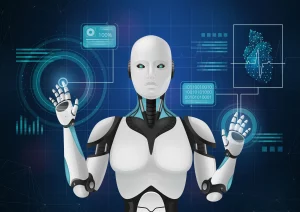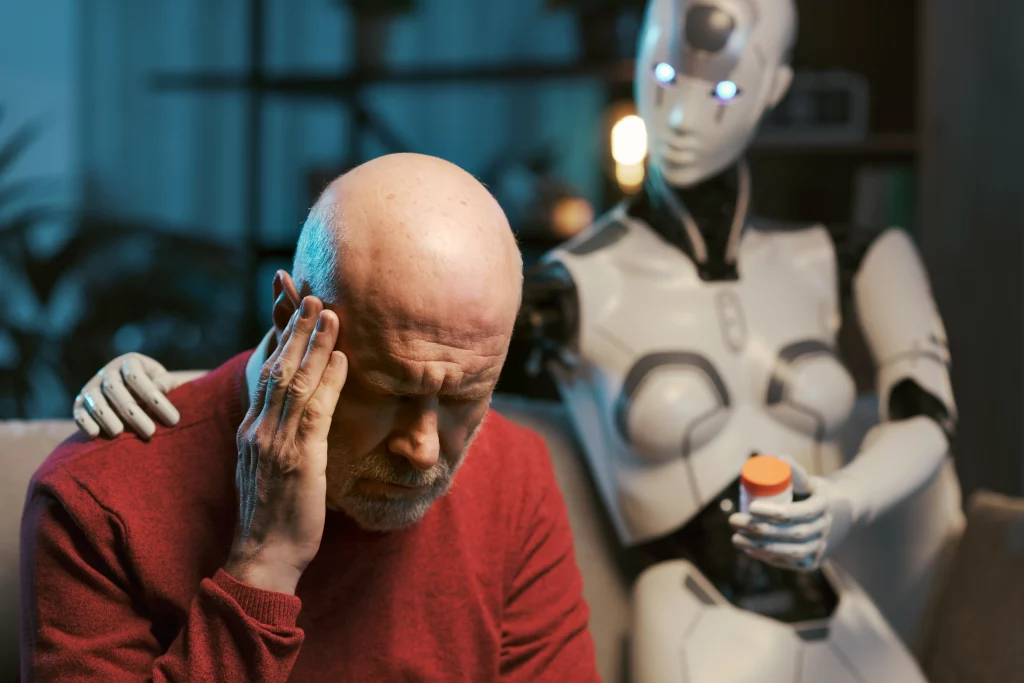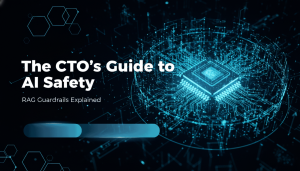The use of AI in Healthcare has emerged as one of the crucial techniques in transforming the healthcare ecosystem. And why not? It helps people who work in healthcare, like doctors and nurses, do their jobs even better and faster. It’s like a helper that makes things easier and cheaper.
Whether making diagnoses quicker or aiding healthcare providers in handling medical information, AI is completely changing how healthcare works. The Use of AI in the Healthcare industry is growing, making it easier to provide accurate treatments.
In this article, you’ll learn more about the various kinds of AI/ML Development Services employed in healthcare and some of their applications and benefits. Additionally, understanding the potential future developments.

How AI Works in Healthcare
AI in healthcare involves the application of advanced algorithms and machine learning techniques to analyze medical data and improve patient care. It encompasses various areas, such as diagnostics, treatment planning, drug discovery, and administrative tasks.
AI algorithms can quickly analyze vast amounts of patient data, including medical records, images, and genetic information, to aid disease detection and diagnosis. They can also assist in predicting patient outcomes and suggesting personalized treatment plans.
AI-driven drug discovery accelerates the identification of potential compounds for various diseases. Natural language processing helps manage administrative tasks like medical documentation.
However, Applications of AI in Healthcare require addressing challenges like data privacy, regulatory compliance, & the need for medical expertise to interpret AI-generated insights.
Types of AI in Health Care
AI is like an umbrella term that covers various interconnected processes. Some common types of AI used in Healthcare include:
Machine learning (ML): training algorithms involve using datasets like health records to develop models capable of tasks like categorizing data or predicting results.
Deep learning: A subset of machine learning that handles larger amounts of data and more complex tasks. It uses many layers of ML algorithms to create neural networks capable of advanced tasks.
Natural language processing (NLP): Using ML to understand human language, whether spoken or written. In healthcare, NLP is used to interpret documents, notes, reports, and research.
Robotic process automation (RPA): AI in computer programs is used to automate administrative and clinical tasks. Some healthcare organizations use RPA to enhance patient experiences and streamline daily operations.
List of Ways AI is Helping the Healthcare Industry

1. AI Health Assistants
Artificial Intelligence (AI) has revolutionized healthcare by streamlining clinical and outpatient processes, allowing doctors to focus on critical cases.
AI-powered mobile apps and chatbots are reshaping the patient-doctor interaction, reducing the need for in-person visits. Chatbots gather symptoms, link them to likely causes, and provide personalized healthcare experiences remotely.
Other Artificial Intelligence applications in Healthcare are answering patient queries, managing medical data, scheduling appointments, and sending reminders.
This personalized approach enhances patient experiences, curbing hospital visits and benefiting both patients and healthcare providers.
2. Early Detection of Diseases
Another important Use of Artificial Intelligence in Healthcare is detecting diseases through advanced data analysis and pattern recognition. By analyzing vast amounts of patient data, including medical records, images, and genetic information, AI algorithms can identify subtle and complex indicators of diseases in their initial stages.
For instance, AI-powered diagnostic tools can spot anomalies in medical images like X-rays and MRIs, aiding in the early detection of conditions like cancer.
Machine learning models can also assess patient risk factors and predict potential disease development. These capabilities empower healthcare professionals to intervene earlier, enabling timely treatment and improved patient outcomes.
AI’s ability to sift through immense data swiftly and identify subtle patterns positions it as a potent tool for identifying diseases at their earliest and most treatable phases.
3. Quick Diagnosis & Treatment
AI accelerates quick diagnosis and treatment through advanced data analysis. It rapidly analyzes vast medical datasets, including images, test results, and patient histories, helping in accurate disease detection.
Moreover, the Use of AI in Healthcare is to forecast disease progression, assisting in proactive treatment planning. Personalized recommendations are generated based on individual patient data, optimizing therapy choices.
AI’s data-driven insights enhance diagnostic accuracy, expedite treatment decisions, and ultimately contribute to better patient care.
4. Research & Drug Creation:
During the Ebola outbreak, AI emerged as a savior. It identified Ebola-carrying bats and helped prevent the disease’s spread by pinpointing potential drugs through existing data.
AI algorithms empowered doctors to comprehend epidemic patterns better and employ demographic insights for targeted monitoring. This enabled researchers to focus on high-prevalence groups. Consequently, AI played a pivotal role in enhancing disease control strategies and facilitating timely interventions.
5. Workflow and Administrative Tasks:
AI is making its mark in healthcare by automating administrative tasks.
For instance, consider voice-to-text transcriptions that assist doctors in swiftly writing chart notes and prescribing medications.
Moreover, AI plays a crucial role in aiding healthcare providers to sift through large amounts of data. Leading to the creation of tailored treatment plans for individualized patient care.
The Future of AI in Health Care
Similar to its impact on various other fields, AI Development Services are set to reshape healthcare in the years to come. Its potential spans beyond enhancing health facility management, patient diagnoses, treatment strategies, and general well-being. AI is also anticipated to contribute to the advancement & uncovering of novel medical remedies.
The anticipated growth of AI adoption in healthcare is substantial in the upcoming decade. While certain studies suggest that AI might lead to notable reductions in jobs as it automates tasks like interpreting medical images, an alternate viewpoint challenges this notion.
We are proud to share that Techwink Services has been mentioned as an Official Research Partner in GoodFirms’ latest research report – “AI in Healthcare: The Future of Patient Care and Health Management”.
The report highlights the growing role of artificial intelligence in transforming the healthcare industry. One of the key findings states that “90% of respondents believe AI can help doctors make better decisions”, showcasing the immense trust and potential AI holds in enhancing patient care and medical decision-making.
As a trusted technology partner, Techwink continues to contribute to advancing healthcare innovation through AI-powered solutions that improve efficiency, accuracy, and patient outcomes.



